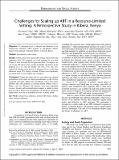Challenges for Scaling up ART in a Resource-Limited Setting: A Retrospective Study in Kibera, Kenya
View/
Publication Date
2009-04-01Type
Article, Journalviews
downloads
Metadata
Show full item recordCitation
Unge C, Södergård B, Ekström AM, Carter J, Waweru M, Ilako F, Ragnarsson A, Thorson A. Challenges for scaling up ART in a resource-limited setting: a retrospective study in Kibera, Kenya. J Acquir Immune Defic Syndr. 2009 Apr 1;50(4):397-402. doi: 10.1097/QAI.0b013e318194618e. PMID: 19214119.
Abstract/
Objective: To determine levels of dropout and adherence in an antiretroviral treatment (ART) program in sub-Saharan Africa's largest urban informal settlement, Kibera, in Nairobi, Kenya. Method: Retrospective cohort study. Results: : Of 830 patients that started ART between January 2005 and September 2007, 29% dropped out of the program for more than 90 days at least once after the last prescribed dose. The dropout rate was 23 per 100 person-years, and the probability of retention in the program at 6, 12, and 24 months was 0.83, 0.74, and 0.65, respectively. Twenty-seven percent of patients had an overall mean adherence below 95%. Being a resident of Kibera was significantly associated with 11 times higher risk of dropout. Conclusion: Despite free drugs and low associated costs, dropout probabilities in this study are higher and adherence to ART is lower compared with other studies from sub-Saharan Africa. Our results illustrate that ART programs in resource-limited settings, such as Kibera, risk low adherence and retention rates when expanding services. Specific and intensified patient support is needed to minimize the risk of dropout and nonadherence causing future significant health threats not only to individuals but also to public health.
Further Details
Retrospective cohort study
Publisher
Lippincott Williams & WilkinsCollections
- General - GEN [367]

